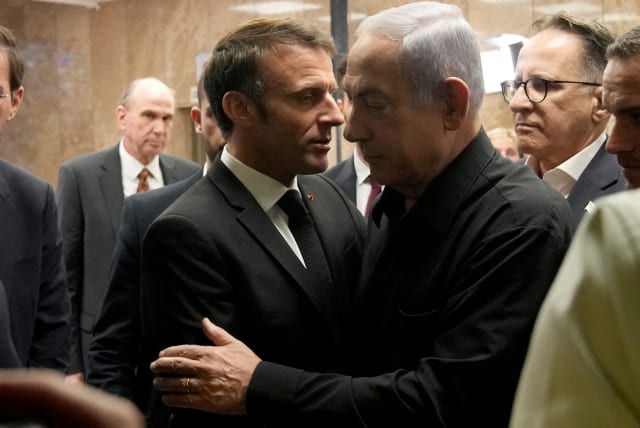Did Netanyahu allow France into Lebanon ceasefire agreement for reduced ICC enforcement?

France was intended to serve the same role as the US in helping to enforce the ceasefire.
Accusations were leveled on Wednesday that Prime Minister Benjamin Netanyahu allowed France's reentry into the Lebanon ceasefire deal in exchange for reduced enforcement of the International Criminal Court's (ICC) arrest warrant against Netanyahu.
The ICC issued arrest warrants against Netanyahu and former Defense Minister Yoav Gallant on Thursday for various war crimes, including starvation, murder, and persecution.
France had always been a planned partner in the ceasefire agreement, having long served as Lebanon's patron since at least the mid-19th century, and was intended to serve the same role as the US in helping to enforce the ceasefire.
Due to increasingly strained relations between Israel and France due to several diplomatic incidents, such as illegally banning Israelis from a French arms fair and French President Emmanuel Macron making statements seen as belittling to Israel's sovereignty, that status was put into question.
The final straw appears to have been after the ICC issued arrest warrants when French Foreign Minister Jean-Noel Barrot confirmed France would enforce the warrants as a signatory to the Rome Statute.
France changes position
However, soon after the signing of the ceasefire agreement, France announced that it could not enforce the warrants because Israel was not a party to the Rome Statute and that, as a result, regular diplomatic immunity might have to be taken into consideration should the ICC request they are arrested, according to Reuters.
Maariv reported that this was directly connected, saying that Israel responded to France's announcement that it would enforce the warrants by telling American mediators that it would not accept a situation in which an openly antagonistic state would be part of the ceasefire agreement.
Strong diplomatic pressure was exerted on Israel to reverse this position, with negotiators pointing out that the entire agreement could collapse over this issue, as Lebanese officials demanded France be one of the guarantors.
Israel reportedly refused this, leading to intense negotiations to salvage the deal. The final agreement would see France agreeing to soften its position on the warrants in exchange for Israel accepting France's return to the agreement.
נתניהו הפקיר את תושבי הצפון כדי להציל את עצמו מבית הדין הבינלאומי בהאג. שוב האינטרסים האישיים שלו מעל הביטחון של כולנו.
— אביגדור ליברמן (@AvigdorLiberman) November 27, 2024
Yisrael Beytenu Party Leader Avigdor Liberman said, "Netanyahu abandoned the residents of the north to save himself from the International Court of Justice in The Hague. Again, his personal interests are above our collective security."
Jerusalem Post Store
`; document.getElementById("linkPremium").innerHTML = cont; var divWithLink = document.getElementById("premium-link"); if (divWithLink !== null && divWithLink !== 'undefined') { divWithLink.style.border = "solid 1px #cb0f3e"; divWithLink.style.textAlign = "center"; divWithLink.style.marginBottom = "15px"; divWithLink.style.marginTop = "15px"; divWithLink.style.width = "100%"; divWithLink.style.backgroundColor = "#122952"; divWithLink.style.color = "#ffffff"; divWithLink.style.lineHeight = "1.5"; } } (function (v, i) { });

